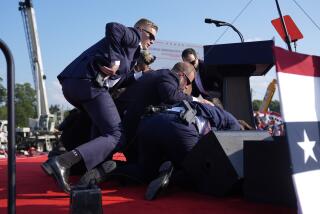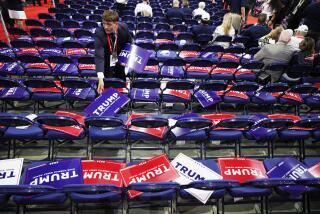Bush Takes CEO Role in Waging War
- Share via
WASHINGTON — Lyndon B. Johnson chose bombing targets in Vietnam. George Bush rallied a Gulf War coalition but neglected the home front. Bill Clinton soaked up every detail of Bosnia and Kosovo.
What kind of war president is George W. Bush turning out to be?
The test of combat hasn’t come yet. But a rough picture is beginning to emerge from the accounts of aides and others who have met with Bush during the last two weeks: the president as CEO, delegating some roles to more-experienced advisors but keeping others to himself.
In military planning, Bush has set the basic course but left much of the detailed work to a powerful--and sometimes divided--war cabinet. In diplomacy, he has hit the telephones with the diligence his father showed during the Persian Gulf War, talking with more than two dozen foreign leaders.
As chief salesman for his newly declared war on terrorism, Bush has spoken in public every day but one since Sept. 11, sometimes even eloquently--a switch for a man who long preferred one-on-one politicking to speechmaking.
And in domestic policy, Bush is about to turn attention to the slumping economy and education reform for the first time since the terrorist attacks on New York and the Pentagon--mindful of charges that his father ignored domestic concerns. Still, the war will come first.
“This is now the focus of my administration,” Bush has said, both publicly and privately.
Indeed, the unsought challenge of terrorism has given the president, whose domestic political agenda and popularity were eroding before Sept. 11, a new and clearer purpose.
Aides describe a decision-making process that is settling into an intense but regular routine: The National Security Council, which once met perhaps twice a month, now meets twice a day. The war is now “our normal state of being,” one weary aide said.
Bush’s daily schedule has been remade to reflect the new reality. He still arrives in the Oval Office at 7 a.m. and gets his customary intelligence briefing from CIA Director George J. Tenet at 8. But now he also has a daily FBI briefing at 8:30 a.m. on the investigation into the terrorist networks that planned the attack. After that comes a regular 9 a.m. “communications meeting” with political advisors Karen Hughes and Karl Rove.
Later in the day come meetings of a new “domestic consequences group” on the war’s effect on the home front, and a variety of other events.
But the main decision-making event is a 9:30 a.m. meeting of the full NSC: Bush, Vice President Dick Cheney, Secretary of State Colin L. Powell, Defense Secretary Donald H. Rumsfeld and National Security Advisor Condoleezza Rice, backed by a roomful of aides.
The same group, minus the president, meets again every evening in what is called a “principals’ meeting” to review the day’s action and plan for the next 24 hours.
Bush has used the morning NSC meetings to hear his Cabinet members hash out their debates on basic policy questions, one aide said--a kind of crash course in counter-terrorism options and a departure from the way he handled most earlier foreign policy decisions.
Bush Has Become More Engaged, Aides Say
Normally, Cabinet members work through an issue at length, brief the president on their areas of agreement and offer him a few clear choices on issues where they disagree.
But this time, Bush has been more deeply engaged, aides say.
“From the very beginning the president decided he wanted to chair the NSC meetings . . . because I think he didn’t want a process where options were coming up to him, where we had said ‘A thinks this, B thinks this, the consensus positions would be this,’ ” said one official who has attended.
“In the earliest phases, he chaired and we had our intellectual discussions about strategy--everybody, with the president there,” the official said. “It was really great.”
It was at those meetings that a key debate raged between Powell and Deputy Defense Secretary Paul D. Wolfowitz over whether to focus on Al Qaeda or go after many terrorist groups at once, officials said.
Wolfowitz and others wanted Bush to define the enemy broadly as all international terrorists and their state sponsors, officials said. Powell, warning that allied countries wouldn’t sign up for a fight against open-ended adversaries, argued for a focus on the most dangerous terrorists, beginning with Al Qaeda and its backers.
Bush’s decision last week to lay out his goals in a speech to Congress forced the two sides to reach an agreement: If only for practical reasons--you can’t fight everyone at once--the United States will focus on Al Qaeda and the countries that support it first and consider other targets later.
Aides refused to describe in detail Bush’s role in that discussion, but it appears that the president played a key part at least in one sense: He never signed on with the hawks’ more ambitious proposals.
That caution was reminiscent of Bush’s first foreign policy crisis, China’s capture of a U.S. surveillance plane in April, when some aides reportedly called for a tough line, only to see the president opt--after an initial angry statement--for patient diplomacy instead.
Bush was especially engaged in drafting the statements that defined the core of the U.S. response to the attack, several aides said. The president doesn’t write his own speeches--few recent presidents have--but he jots phrases on paper with a black felt-tip pen and tries them out on others.
In perhaps his most important piece of speech writing, Bush rejected the first draft of the statement he would make in the Oval Office on the evening of Sept. 11--the one in which he announced: “We will make no distinction between the terrorists who committed these acts and those who harbor them.”
Changing Speech From ‘Foreign-Policy-Speak’
The first draft from Rice and Powell was softer--”kind of flowery . . . foreign-policy-speak,” an aide said. By the time the president delivered it, though, it had been translated into Bush-speak.
Over the last two weeks, the NSC meetings have shifted from designing a policy to carrying it out, aides said.
“He goes around and he basically takes a report from everybody,” said one official who attended a recent session. “He tends to give out assignments.”
Saturday’s meeting, with Bush in Camp David, was held by videoconference.
But one thing hasn’t happened yet: a full-dress briefing for Bush on military options in the “tank,” the Joint Chiefs of Staff’s top-secret conference room deep in the Pentagon. That may be a sign that combat is not yet imminent.
So may be Bush’s tentative steps this week to turn some attention to issues beyond terrorism: the economy, education reform, faith-based initiatives and a free-trade agreement with Jordan.
On Saturday, in his weekly radio address, Bush assured listeners that he was not forgetting to work on ways to revive the sputtering economy.
The economy “has had a shock,” Bush said, but for all the challenges it faces--a battered stock market, declining corporate profits and slumping airline and tourism industries--”the American economy is fundamentally strong.”
“We have the best-educated, most productive work force in the world. Our factories produce more goods, and a broader variety of goods, than any country in the world,” he said.
Aides have said Bush was deeply scarred by seeing his father’s popularity plunge from its high point--after his victory in the Persian Gulf War in 1991--to well below 50% in only a year. The lesson, they said, was that voters appreciate foreign policy success but insist on economic success.
“It’s important, in addition to addressing the immediate crisis, to continue with the important work Americans wanted us to move forward,” John Bridgeland, Bush’s chief domestic policy assistant, said of the effort to turn White House attention to issues beyond terrorism.
Bush appears to have chosen issues that can win bipartisan support, while avoiding the most contentious items on his domestic agenda, such as patients’ rights.
In addition, he is likely to push for completion of the budget with as little partisan debate as possible.
On Saturday, the Democrats’ leader in the House of Representatives promised a bipartisan effort on the economy. “We will help unemployed workers in the airline, aerospace, tourist and other industries affected by the attacks,” Rep. Richard A. Gephardt (D-Mo.) said in his radio response. “There is no place for partisanship here.”
A Democratic political advisor who worked for then-President Carter during the crisis when Iran held 52 Americans hostage said Bush’s tack makes political sense.
Bush’s ‘Timing Is Right,’ Former Carter Aide Says
“The fact Bush is saying ‘OK, folks, we’re getting on with life’ is a big deal,” he said, begging for anonymity as he praised a Republican president. “The timing is right. As long as he looks like he’s hunkering down, then everyone else feels they have to hunker down.”
Kenneth M. Duberstein, who served as White House chief of staff under President Reagan, agreed.
“You can’t become paralyzed,” Duberstein said. “You have to go on and take care of things. You can’t stockpile these issues for manana,” he said.
Still, Duberstein said, it would be a mistake for Bush to push hard on more divisive issues such as his energy program, with its emphasis on exploring for oil and gas in Alaska’s Arctic National Wildlife Refuge, even though he could argue that the nation needs to reduce reliance on foreign energy.
This morning, Bush plans to make the official return to normal life--at least a wartime brand of normal life.
After sunrise, the president and a contingent of U.S. Marines at Camp David are raising the American flag to full staff for the first time since the terrorist attacks of Sept. 11.
Only the president can order the flag to half-staff nationwide. After the Sept. 11 attack, Bush declared a period of national mourning ending Saturday evening, when the flags at half-staff came down.
More to Read
Get the L.A. Times Politics newsletter
Deeply reported insights into legislation, politics and policy from Sacramento, Washington and beyond. In your inbox three times per week.
You may occasionally receive promotional content from the Los Angeles Times.











